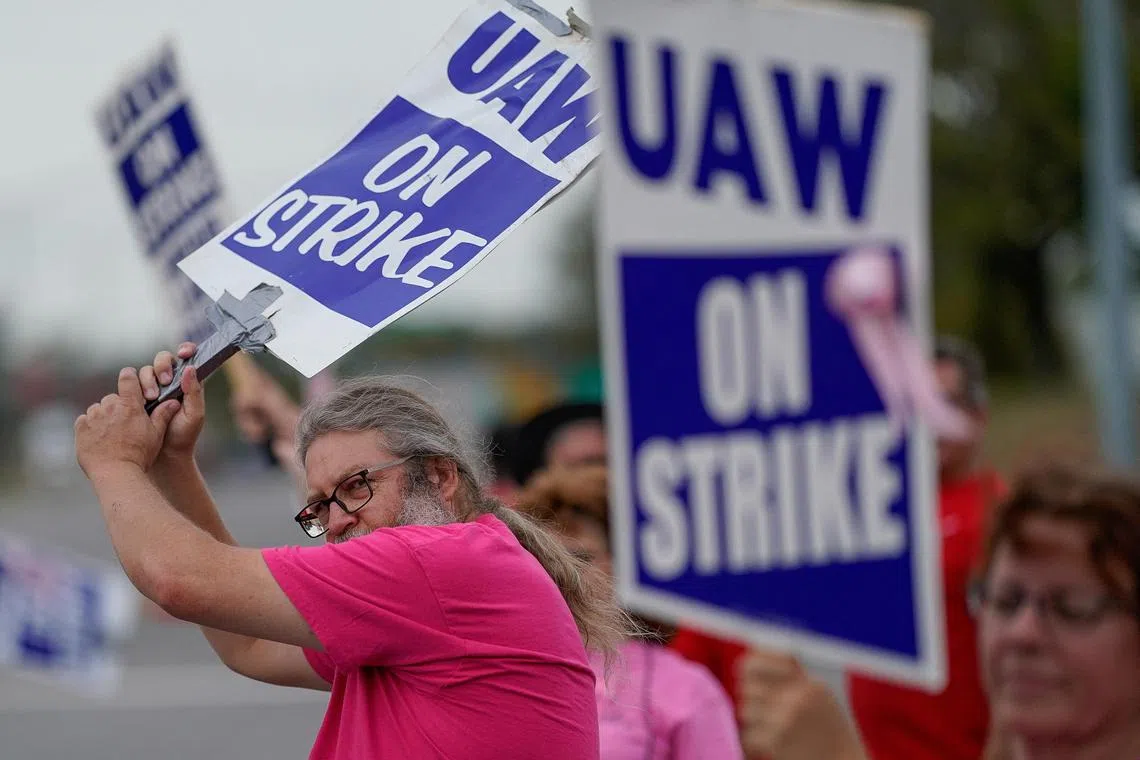US auto workers launch first simultaneous strikes at Detroit Three carmakers
Sign up now: Get ST's newsletters delivered to your inbox

The United Auto Workers union has launched the most ambitious US industrial labour action in decades.
PHOTO: REUTERS
DETROIT - The United Auto Workers (UAW) union launched simultaneous strikes at three US Detroit Three factories early on Friday, kicking off the most ambitious American industrial labour action in decades.
The walkouts will halt production of the Ford Bronco sport utility vehicle (SUV), the Jeep Wrangler and the Chevrolet Colorado pick-up truck, along with other popular vehicle models.
UAW president Shawn Fain said the union will hold off for now on a broad, general strike, but he added that all options are open if new contracts are not agreed on.
Mr Fain laid out the plans for the unprecedented, simultaneous walkouts at Ford, General Motors and Chrysler parent Stellantis in a Facebook Live address less than two hours before the expiration of the old contract.
“For the first time in our history we will strike all three of the Big Three,” Mr Fain said.
The strikes
Mr Fain’s decision to go with targeted walkouts could limit the cost to the union of strike pay.
The UAW has a strike fund of US$825 million (S$1.1 billion), which pales in comparison to the billions in liquidity the automakers have built up thanks to robust profits from the trucks and SUVs UAW members build.
A limited strike could also reduce the potential economic damage economists and politicians fear would result from a widespread, lengthy shutdown of Detroit Three operations.
Stellantis has more than 90 days worth of Jeeps in stock, and has been building SUVs and trucks on overtime, according to Cox Automotive data.
But a week-long shutdown at Stellantis’ Jeep plant in Toledo could cut revenue by more than US$380 million, based on data from the company’s financial reports.
“If the negotiations don’t go in a direction that Fain thinks is positive, we can fully expect a larger strike coming in a week or two,” said Mr Sam Fiorani, a production forecaster at Auto Forecast Solutions.
He estimated the limited action would stop production of about 24,000 vehicles a week.
And, while it targets some key brands, like the Bronco, buyers would be willing to wait, for now.
Companies fear cost hikes
The union has said it wants a 40 per cent raise.
The companies have offered up to 20 per cent, but without key benefits demanded by the union.
None of the Detroit Three has proposed eliminating tiered wage systems that require new hires to stay on the job for eight years to earn the same as veteran workers – a central UAW demand.
Ford said in a statement that the UAW’s latest proposals would double its US labour costs, and make it uncompetitive against Tesla and other non-union rivals.
Ahead of Mr Fain’s address, General Motors’ top manufacturing executive Gerald Johnson said in a video that the UAW’s wage and benefits proposals would cost the automaker US$100 billion, “more than twice the value of all of General Motors and absolutely impossible to absorb”.
He did not detail how the union proposals would result in that cost, or over what timeframe.
Ford chief executive Jim Farley said before the address that the future of the industry was at stake.
“Let’s do everything we can to avert a disastrous outcome,” he said.
Mr Fain has rejected the automakers’ assertions that union demands would cost too much, saying the companies have spent billions on share buybacks and executive salaries.
Suppliers and other industries that depend on automakers and their workers could see demand and cash dry up if the UAW shuts down the Detroit Three’s US manufacturing operations.
The stand-off has become a political issue, with United States President Joe Biden, facing re-election in 2024, prominently calling for a deal.
Mr Biden is pouring billions in federal subsidies into expanding sales of electric vehicles (EVs).
But the shift to EVs could threaten UAW jobs. The union has not endorsed Mr Biden’s re-election.
“I think the Biden administration just continues to watch this slow-moving car crash as its EV strategy collides head-on with unions,” Wedbush analyst Dan Ives said.
While a deal with one or more of the automakers could come at any time, the disruption is an opportunity for non-union automakers in the US, including Tesla, Toyota, Honda and Mercedes.
Those non-union factories, plus imported vehicles, account for more than half of the vehicles sold in the US market.
But the Detroit automakers build some of the US market’s best-selling vehicles, such as the Ford F-150 and Chevrolet Silverado pick-up trucks and Jeep SUVs. REUTERS


